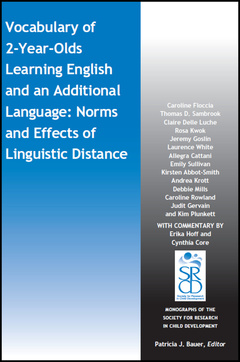Vocabulary of 2-Year-Olds Learning English and an Additional Language: Norms and Effects of Linguistic Distance Monographs of the Society for Research in Child Development (MONO) Series
Auteurs : Floccia Caroline, Sambrook Thomas D, Delle Luche Claire, Kwok Rosa, Goslin Jeremy, White Laurence, Cattani Allegra, Sullivan Emily, Abbot-Smith Kirsten, Krott Andrea, Mills Debbie, Rowland Caroline, Gervain Judit, Plunkett Kim
Directeur de Collection : Bauer Patricia J.

The majority of the world?s children grow up learning two or more languages. The study of early bilingualism is central to current psycholinguistics, offering insights into issues such as transfer and interference in development. From an applied perspective, it poses a universal challenge to language assessment practices throughout childhood, as typically developing bilingual children usually underperform relative to monolingual norms when assessed in one language only. We measured vocabulary with Communicative Development Inventories for 372 24-month-old toddlers learning British English and one Additional Language out of a diverse set of 13 (Bengali, Cantonese, Dutch, French, German, Greek, Hindi-Urdu, Italian, Mandarin, Polish, Portuguese, Spanish and Welsh). We furthered theoretical understanding of bilingual development by showing, for the first time, that linguistic distance between the child?s two languages predicts vocabulary outcome, with phonological overlap related to expressive vocabulary, and word order typology and morphological complexity related to receptive vocabulary, in the Additional Language. Our study also has crucial clinical implications: we have developed the first bilingual norms for expressive and receptive vocabulary for 24-month-olds learning British English and an Additional Language. These norms were derived from factors identified as uniquely predicting CDI vocabulary measures: the relative amount of English versus the Additional Language in child-directed input and parental overheard speech, and infant gender. The resulting UKBTAT tool was able to accurately predict the English vocabulary of an additional group of 58 bilinguals learning an Additional Language outside our target range. This offers a pragmatic method for the assessment of children in the majority language when no tool exists in the Additional Language. Our findings also suggest that the effect of linguistic distance might extend beyond bilinguals? acquisition of early vocabulary to encompass broader cognitive processes, and could constitute a key factor in the study of the debated bilingual advantage.
CONTENTS
7 I: INTRODUCTION
Caroline Floccia, Thomas D. Sambrook, Claire Delle Luche, Rosa Kwok, Jeremy Goslin, Laurence White, Allegra Cattani, Emily Sullivan, Kirsten Abbot-Smith, Andrea Krott, Debbie Mills, Caroline Rowland, Judit Gervain, and Kim Plunkett
30 II: METHODS
Caroline Floccia, Thomas D. Sambrook, Claire Delle Luche, Rosa Kwok, Jeremy Goslin, Laurence White, Allegra Cattani, Emily Sullivan, Kirsten Abbot-Smith, Andrea Krott, Debbie Mills, Caroline Rowland, Judit Gervain, and Kim Plunkett
43 III: ANALYSES AND RESULTS FOR STUDY 1: ESTIMATING THE EFFECT OF LINGUISTIC DISTANCE ON VOCABULARY DEVELOPMENT
Caroline Floccia, Thomas D. Sambrook, Claire Delle Luche, Rosa Kwok, Jeremy Goslin, Laurence White, Allegra Cattani, Emily Sullivan, Kirsten Abbot-Smith, Andrea Krott, Debbie Mills, Caroline Rowland, Judit Gervain, and Kim Plunkett
61 IV: RESULTS FOR STUDIES 2 AND 3: THE UKBTAT MODEL AND ITS APPLICATION TO NONTARGET ADDITIONAL LANGUAGE LEARNERS
Caroline Floccia, Thomas D. Sambrook, Claire Delle Luche, Rosa Kwok, Jeremy Goslin, Laurence White, Allegra Cattani, Emily Sullivan, Kirsten Abbot-Smith, Andrea Krott, Debbie Mills, Caroline Rowland, Judit Gervain, and Kim Plunkett
68 V: GENERAL DISCUSSION
Caroline Floccia, Thomas D. Sambrook, Claire Delle Luche, Rosa Kwok, Jeremy Goslin, Laurence White, Allegra Cattani, Emily Sullivan, Kirsten Abbot-Smith, Andrea Krott, Debbie Mills, Caroline Rowland, Judit Gervain, and Kim Plunkett
81 APPENDIX
91 REFERENCES
109 ACKNOWLEDGMENTS
COMMENTARY
110 ADVANCES IN THE ASSESSMENT OF YOUNG BILINGUALS: COMMENTS ON FLOCCIA ET AL.
Erika Hoff and Cynthia Core
124 CONTRIBUTORS
127 SUBJECT INDEX
Dr. Caroline Floccia is a Reader in Developmental Psychology at the University of Plymouth. She is primarily interested in early lexical and phonological development. She completed her Ph.D. at the Ecole des Hautes Etudes en Sciences Sociales in Paris and was a lecturer at the Universitede Franche-Comte (France) until 2006.
Dr. Tom Sambrook holds doctorates in primatology from the University of St. Andrews and neuroscience from the University of Plymouth. He is Lecturer in Psychology at the University of East Anglia.
After a Ph.D. in cognitive science on referential processing and attachment ambiguities, Dr. Claire Delle Luche has been working on the acquisition of the child’s lexicon, focusing on variability in the input and phonological aspects. She is currently a Lecturer at the University of Essex.
Dr. Rosa Kwok is a Research Associate at the Centre for Research in Psychology, Behaviour and Achievement at Coventry University. Rosa’s research focuses on the interface between cognitive development and language impairment. She obtained her DPhil in Psychology from the University of York in 2014.
Dr. Jeremy Goslin holds a Ph.D. in Computer Science from the University in Sheffield and is currently an Associate Professor in Psychology at the University of Plymouth. His research interests are computational and neuroimaging approaches to psycholinguistics, and behavioral economics.
Dr. Laurence White has been a Lecturer in Psychology at the University of Plymouth since 2011. He completed his Ph.D. in linguistics (Edinburgh, 2002) and carried out postdoctoral research on speech perception and production at the University of Bristol and SISSA, Trieste.
Dr. Allegra Cattani obtained her Ph.D. in Experimental Psychology at the University of Genova (Italy) in 1999. She is currently a Senior Research Fellow at the University of Plymouth and manager of the Plymouth Babylab. Her main researc
Date de parution : 03-2018
Ouvrage de 136 p.
15.2x22.9 cm
Thème de Vocabulary of 2-Year-Olds Learning English and an... :
Mots-clés :
contents; floccia; debbie; methods; plunkett; caroline; ii; linguistic distance; vocabulary; effect; study; learners; application; language; nontarget; plunkett iv; studies; additional
